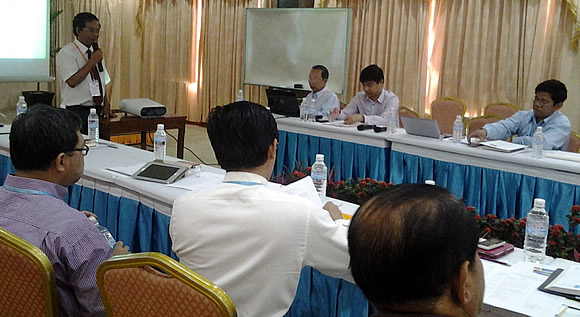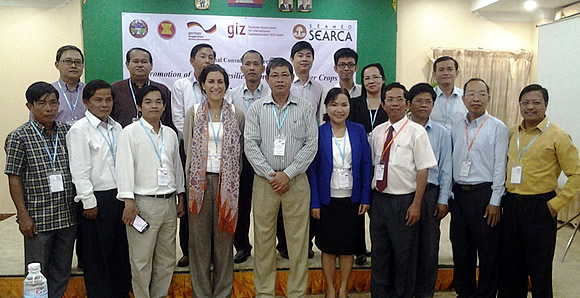This is part of the regional initiative of the ATWGARD supported by the German Development Cooperation (GIZ) funded German- ASEAN Program on Climate Change (GAP-CC).
The consultative meeting gathered key officials from CARDI, the Plant Protection and Soil Resources Departments of the General Directorate for Agriculture (GDA), Provincial Department of Agriculture of Sihanoukville and Takeo, Preak Leap National School of Agriculture (PNSA), Center for Livestock and Agriculture Development (CLAD), CelAgrid (private sector), United Nations Development Programme (UNDP) Cambodia, and the Royal University of Agriculture (RUA).
Dr. Ouk Makara, Executive Director of CARDI and Focal Person for ATWGARD, presented the government policy on climate change and the situationer on rice, corn, and cassava. Ms. Myriam Fernando, Senior Advisor of the German ASEAN Program on Climate Change (GAP-CC), discussed the project overview and expected outputs of the ASEAN Network on Promoting Climate Resilience of Rice and Other Crops.
Dr. Lope B. Santos III, SEARCA Program Specialist and Officer-in-Charge for Project Development and Management, provided a briefing on the role of SEARCA and key project activities. Dr. Men Sarom, SEARCA National Team Leader for Cambodia and current Vice Rector of the Royal University of Agriculture (RUA), discussed the methodology and selection criteria for good practices.
SEARCA is commissioned by GAP-CC to coordinate and facilitate national consultative meetings and regional workshops which aim to: (1) promote common understanding and exchange of experiences on climate change and agriculture focused on selected crops (rice, corn, and cassava); (2) identify successful practices and policies for tackling these climate change-related threats that can be promoted and up-scaled; and (3) identify common concerns and capacity needs, and propose regional support strategies and instruments to address these in a coherent manner. The project covers Cambodia, Indonesia, Lao PDR, Myanmar, the Philippines, Thailand, and Vietnam.
The outputs of this meeting will be consolidated into a sub-sector analysis for rice and cassava, documentation of good practices, and identification of priority needs which can be shared with other ASEAN Member States to determine regional support strategies and tools for adaptation. The final country output will be presented in another national consultative meeting to validate findings and recommendations. Mr. Leng Sothat, Research Assistant, Ms. Hak Rina, and Ms. Ngov Chansrey Roat from RUA provided technical and administrative support during the consultative meeting.

